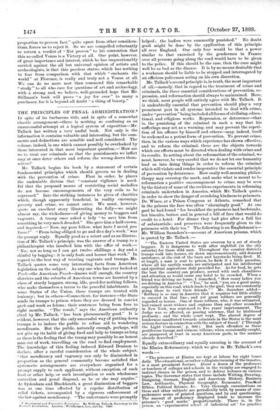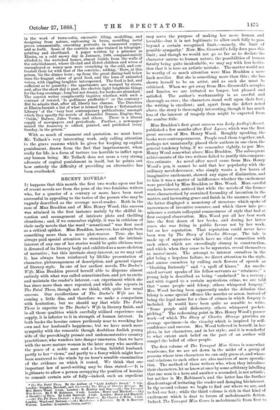THE PRINCIPLES OF PENAL ADMINISTRATION.* IN spite of its barbarous
title, and in spite of a somewhat
chaotic arrangement—there is nothing so confusing as an unsuccessful attempt at a logical system of exposition—Mr. Tallack has written a very useful book. Not only is the information it contains valuable and interesting, but the com- ments and deductions are sensible and well considered. The volume, indeed, is one which cannot possibly be overlooked by those interested in that most important question,—' How are we to treat our criminals so that the punishments we inflict may at once deter others and reform the wrong-doers them- selves ?'
Mr. Tallack begins his book by a statement of certain fundamental principles which should govern us in dealing with the prevention of crime. First in order, he places the undeniable dictum that "constant vigilance is need- ful that the proposed means of restricting social maladies do not become encouragements of the very evils to be repressed." Into the striking instances he gives of charities which, though apparently beneficial, in reality encourage poverty and crime, we cannot enter. We must, however, quote an excellent story illustrating the folly—we might almost say, the wickedness—of giving money to beggars and vagrants. A tramp once asked a lady "to save him from something he very much dreaded." She gave him a half-crown, and inquired,—" Now, my poor fellow, what have I saved you from ?" "From being obliged to go and do a day's work," was the prompt reply. Equally good as a retort and as an illustra- tion of Mr. Tallack's principle, was the answer of a tramp to a philanthropist who insulted him with the offer of work,— " No ; not so long as I can get twelve shillings a day and a skinful by begging : it is only fools and horses that work." In regard to the best way of treating vagrants and tramps, Mr. Tallack quotes some very interesting facts from American legislation on the subject. As any one who has ever looked at Puck—the American Punch—knows well enough, the country districts and the suburbs of American towns are haunted by a class of sturdy beggars, strong, idle, good-for-nothing fellows, who make themselves a terror to the peaceful inhabitants. In some States of the Union, these tramps are treated with leniency; but in others—Connecticut, for instance—the State sends its tramps to prison, where they are dressed in convict garb and work as felons ; their sentences being from four to eight months. "The result," says the American authority cited by Mr. Tallack, "has been phenomenally good." It is evident, however, that the only successful way of putting down tramps is to induce the public to refuse aid to wandering mendicants. But the public, naturally enough, perhaps, will not give up its habit of giving food and help to tramps as long as there is the feeling that the tramp may possibly be an honest,
man out of work, travelling on the road to find employment. The knowledge of this feeling induced Edward Denison to declare, after a careful consideration of the whole subject, "that mendicancy and vagrancy can only be diminished in proportion as the general community become satisfied that systematic arrangements are everywhere organised for a prompt supply to each applicant, without exception, of such food or other help, or such investigation or such wholesome correction and penal disposal, as he or she may require."
At Sydenham and Blackheath, a great diminution of beggars was at one time effected by a regular distribution of relief tickets, accompanied by a rigorous enforcement of the law against mendicancy. "The unfortunate were promptly
• Penological aud Prerentire Principles. By William Tallnek, Secretary to the Howard 2osociation. London Wertheimer, Lea, and Co. 1939.
helped ; the loafers were summarily punished." No doubt good might be done by the application of this principle all over England. Our only fear would be that a power similar to that exercised by the gendarmes in France
over all persons going along the road would have to be given to the police. If this should be the case, then the cure might well be as bad as the disease. It is by no means desirable that a workman should be liable to be stopped and interrogated by
an officious policeman acting on his own discretion.
Mr. Tallack's second principle is, in truth, the most important of all,—namely, that in regard to the treatment of crime and criminals, the three essential considerations of prevention, re- pression, and reformation should always be maintained. Here, we think, most people will entirely agree with Mr. Tallack. It
is undoubtedly essential that prevention should play a very- prominent part in all systems intended to deal with crime, under " prevention " being included all forms of civilising, educa-
tional, and rdigious works. Repression, or deterrence—that is, the punishing of the criminal in such a way that his sufferings may act as a warning, and may prevent the repeti- tion of his offence by himself and others—may, indeed, itself be reckoned as a potent form of prevention. To prevent crime, then, in the various ways which experience has shown effective, and to reform the criminal, these are the objects towards which our efforts must be directed when dealing with crime and its results. In setting about the reformation of the criminal, we must, however, be very careful that we do not let our humanity lead us into doing things in order to reform the criminal which will violate and render inoperative the essential principle of prevention by deterrence. How easily well-meaning philan- thropy may overstep the mark, and make what is meant to be reformation a positive encouragement to crime, may be seen by the history of some of the reckless experiments in reforming criminals undertaken in America, which Mr. Tallack quotes in order to show the danger of overdoing kindness to prisoners.
Dr. Wines, at a Prison Congress at Atlanta, remarked that in the prisons the fare was often "alarmingly good." At one gaol he had found "for breakfast the prisoners had beefsteaks, hot biscuits, butter, and in general a bill of fare that would do. credit to a hotel. For dinner they had pies after a full list of substantials ; and preserves were frequently given to the- prisoners with their tea." The following is an Englishman's— Mr. William Saunders's—account of American prisons, which
is quoted by Mr. Tallack :—
" ' The Eastern United States are overrun by a set of sturdy beggars. It is dangerous to walk after nightfall (in the city suburbs) for these wild men. Throughout the country districts tramps walk into houses, sit down unceremoniously, and demand assistance, at the risk of the barn and haystacks being fired. If, at length, a man is sent to prison, he finds it a little paradise, where all his earthly wants are anticipated and his intellectual and spiritual aspirations duly provided for. As for food, he gets the beet the country can produce, served with such cleanliness and attention as would cause any hotel to be crowded. When a friend was driving me home, I remarked, "How many ladies you see driving in America !" "Yes," he said, "you see a good many, especially on this road, which leads to the gaol; they are constantly going there to visit their friends." ' Mr. Saunders added- ' Robbery is so easy in America that it requires but little ability to succeed in that line ; and yet great robbers are generally regarded as heroes. One of these robbers, who, it was estimated, had ruined more widows and orphans than any other scoundrel in New York, was sentenced .to five years' imprisonment. The Judge was so affected, on passing sentence, that he blubbered profusely ; and the whole court wept. The absurd degree of tenderness manifested towards criminals in the States is the most serious feature in connection with the subject of fraud.' ('Through the Light Continent,' p. 369.) But such offenders as these pestiferous tramps and ruinous villains, when occasionally caught. are pampered, at least in many American gaols, in the manner already described !"
Equally extraordinary and equally amusing is the account of the Elmira Reformatory, which we give in Mr. Tallack's own words :—
" The prisoners at Elmira are kept at labour for eight hours daily. The educational, or rather collegiate training of the inmates, is a most prominent feature. About a dozen of the professors or teachers of colleges and schools in the vicinity are engaged to instruct classes in the prison, and to deliver lectures on various topics. The Governor states that these include Writing, Drawing, Designing, German, English and American History, Business Law, Arithmetic, Physical Geography, Economics, Practical Ethics, Political Science, &c. Very thorough examinations on these and other subjects are periodically held, by means of com- prehensive series of printed questions, and by oral questioning. The amount of proficiency displayed tends to increase the prisoner's good marks' proportionately. There is, in the prison, an experimental school of industrial art' for practice
With so much of comment and quotation, we must leave Mr. Tallack's very interesting work, only calling attention to the grave reasons which he gives for keeping up capital punishment, drawn from the fact that imprisonment, when really for life, is a form of torture too horrible to inflict upon any human being. Mr. Tallack does not seem a very strong advocate of capital punishment in itself, but he points out how entirely the difficulty of providing an alternative has been overlooked. in the work of terra-cotta, encaustic tiling, modelling, and designing from nature, embossing in brass, moulding metal pieces ornamentally, executing portraits in hammered copper, and so forth. Some of the convicts are also trained in telegraph- printing and shorthand. A paper written by a prisoner in Elmira, on a cold snowy day in January, 1888, compassionately alluded to the wretched homes, almost visible from the walls of the establishment, where ill-clad and ill-fed children and wives of unemployed or weary men were crouching in the cold, and con- trasted their lot with that of the convicts ; adding, Here, at this prison, 'tie the dinner hour ; up from the great dining-hall below rises the fragant odour of good food, and the hum of animated voices, with rippling laughter interspersed. The food is hot, and sufficient as to quantity ; the apartments are warmed by steam, and, after the short day is past, the electric light brightens things for the long evenings ; long but not dreary, for books are abundant.' The convict writer complacently inquires whether, with such a contrast of reward, Is godliness profitable ?' or the contrary ? But he admits that, after all, liberty has charms. The Directors at Elmira furnish a list of what is termed by them a Reformatory Library' of the very best contemporary publications,' amongst which they specify the novels of Alexander Dumas, Eugene Sue, Oujda,' Bulwer, Jules Verne, and others. There is a liberal supply of newspapers and periodicals. Further, a newspaper named the Summary is edited, printed, and published every Sunday, in the prison."







































 Previous page
Previous page